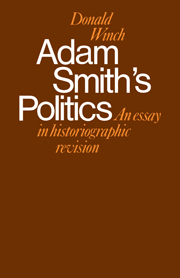Book contents
- Frontmatter
- Contents
- Acknowledgements
- Abbreviations
- 1 Introduction: the problem – the liberal capitalist perspective
- 2 Republicanism and sceptical Whiggism
- 3 Hutcheson and Smith: Real Whig versus sceptical Whig
- 4 Commerce, liberty and justice
- 5 Martial spirit and mental mutilation
- 6 A ruinous expedient
- 7 The present disturbances
- 8 Conclusion
- Bibliography
- Index
- Title in the series
1 - Introduction: the problem – the liberal capitalist perspective
Published online by Cambridge University Press: 03 February 2010
- Frontmatter
- Contents
- Acknowledgements
- Abbreviations
- 1 Introduction: the problem – the liberal capitalist perspective
- 2 Republicanism and sceptical Whiggism
- 3 Hutcheson and Smith: Real Whig versus sceptical Whig
- 4 Commerce, liberty and justice
- 5 Martial spirit and mental mutilation
- 6 A ruinous expedient
- 7 The present disturbances
- 8 Conclusion
- Bibliography
- Index
- Title in the series
Summary
In the two hundred years that have passed since the publication of the Inquiry into the Nature and Causes of the Wealth of Nations, Adam Smith's reputation as a pioneering exponent of, and leading spokesman for, the principles of liberal capitalist society has become firmly established. It is a role which qualifies him to be the founding father of classical political economy, and hence one of the chief forerunners of Marx's analysis of nineteenth-century capitalism as well as of orthodox economics. It was largely in this role that economists and others throughout the world celebrated the bicentenary of the Wealth of Nations in 1976, thereby upholding a tradition established in the centennial and sesquicentennial years.
While I shall be concerned here with the liberal capitalist perspective on Smith, I have little to say directly about the economists' Smith – the figure cultivated by generations of historians of economic thought. Nor do I deal with Smith's oeuvre taken as a whole. For while I shall refer to most of his writings, I am chiefly interested in an aspect of them that can be described as ‘political’ in the broadest sense of the term. Moreover, I shall be concerned throughout with what Smith can legitimately be said to have intended, rather than with what he might be said to have anticipated or foreshadowed. Indeed, as my sub-title suggests, this essay can be seen as a contribution to a more general argument in favour of a historical interpretation of Smith's intentions and achievements.
- Type
- Chapter
- Information
- Adam Smith's PoliticsAn Essay in Historiographic Revision, pp. 1 - 27Publisher: Cambridge University PressPrint publication year: 1978

